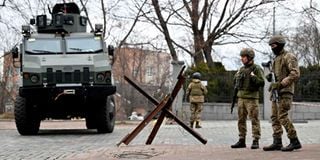Russia-Ukraine conflict not good for Africa

Ukrainian Military Forces servicemen block a road in the so-called government quarter in Kyiv on February 24, 2022 as Russia's ground forces invaded Ukraine from several directions, encircling the country within hours of Russian president announcing his decision to launch an assault.
What you need to know:
- Kenya has pointed out that Russia’s bid was like “looking over backward into history with a dangerous nostalgia.”
- A war between these countries means much more than the increase in pump prices upward, globally.
Kenya and the rest of Africa have been negotiating through diplomatic ties, to quell the unrest that is fast-spreading across the Euro-Asian region, involving Russia, Ukraine and recently the unrest in neighbouring Kazakhstan, where protests were at their peak in January over the government’s removal of fuel price caps.
The tension between Ukraine and Russia that spilled over to Kazakhstan is clearly not positive for trade facilitation across the whole of Africa, given that Russia is the fourth-biggest buyer of Kenyan tea, having taken up produce worth Sh.6.2 billion in the 11 months to November 2021.
Russia is also the world’s third-largest oil producer and the conflict in Ukraine could lead to a substantial decrease in the flow of Russian barrels to the global market, posing a risk to the tight balance between supply and demand for African countries including Kenya.
It was therefore quite accurate and thoughtful of Martin Kimani, Kenya’s Permanent Representative to the UN, when he told the UN Security Council that Ukraine’s territorial integrity had been breached and that Russia’s move could easily be borrowed by another ambitious power.
Kenya has pointed out that Russia’s bid was like “looking over backward into history with a dangerous nostalgia.” It begs the question of what this could mean for former Soviet states like Kazakhstan. It leaves the rest of the nations in a trade and diplomatic limbo, since they are highly dependent on European Union (EU) relations and diplomatic ties, for seamless trade.
For Kenya, it totally doesn’t sit in well that the year 2022 is an election year and the economy has been depressed and recovering from the post-Covid-19 aftermath that had a huge negative effect on the overall GDP. Instability in the Euro-Asian countries definitely affects EU-Africa trade, hence the need for Kenya to meddle through diplomatic ties.
Increase in pump prices
As if the Ukraine-Russia feud is not bad enough, Russia left a bad taste among global leaders when it supported Kazakhstan military in stabilising the country during the recent demonstrations that saw the arrest of innocent civilians in Kazakhstan and the country’s Chief of National Security Committee (KNB) Karim Massimov, a noted modernizer and two-time former Prime Minister.
This is without mentioning the 227 individuals who are known to have lost their lives in the unrest, the worst single death toll in the region in decades, as the authorities implemented a ‘shoot to kill’ order. The plight of Massimov – who drove much of the country’s institutional reform – and other political prisoners will be an important signal of Kazakhstan’s future path and alignment with Moscow.
A war between these countries means much more than the global increase in pump prices. It means trade and travel restrictions both in Africa and the rest of the world. This informed Dr Kimani’s statement to the UN Security Council, when he said, “We must complete our recovery from embers of dead empires in a way that doesn’t plunge us back into new forms of dominion and oppression... We rejected irredentism and expansionism on any basis, including racial, ethnic, religious or cultural factors. We reject it again today.”
Well, it is important for Kenya to be vocal in this entire situation, since Kenya connects the East African region to Ukraine and Russia as a leader in trade and economic cooperation within the bloc. As a member of the AU, Kenya benefits from bilateral ties negotiated through the platform with the Euro-Asia region and beyond.
Prior to the tension in the countries, Russia had strategically showed interest in strengthening cooperation with Africa through the African Union (AU). On February 4th, for instance, at the Assembly of Heads of State of the AU meeting held in Addis Ababa, Russia reaffirmed its determination to strengthen economic, scientific, technical and humanitarian ties with African nations.
High cost of living
These commitments can only be achieved when the feud with Ukraine is resolved, hence it is important for all nations to hold peace talks with these two countries with the aim of restoring macro-economic longevity and better cross border trade.
Without stability in these countries, African countries should brace themselves for increased energy and food prices, which has so far sent global oil prices soaring and restricted wheat exports.
Kenya cannot afford a fanning of oil prices given the current high cost of living which recently sparked online demonstrations with a hash tag #LowerFoodPrices. We are typically looking at inflation through costly transport, electricity and other manufactured goods, should the oil prices increase further.
Disruptions from any military action or sanctions could also see bread and wheat flour prices increase in African countries, which rely on imported wheat from Ukraine and Russia.
The two countries are major sources of wheat imports for African countries, Russia being the world’s leading wheat exporter and Ukraine the fourth. Both countries ship their grain from Black Sea ports, which are directly in the line of disruptions from any conflict between them. A disruption in wheat shipments will make the grains more costly at a moment when Russia has imposed higher duty on exports to protect its local market.
With all this in mind, Kenya would definitely be interested in a peaceful resolution to the dispute and has already waded into the Eastern European conflict, stating that Russia’s move to recognise two breakaway Ukrainian regions as independent could rekindle dangerous expansions by “dead empires”.
Mr Njoroge is a Mechanical Engineer with an interest in geopolitical issues. [email protected]





